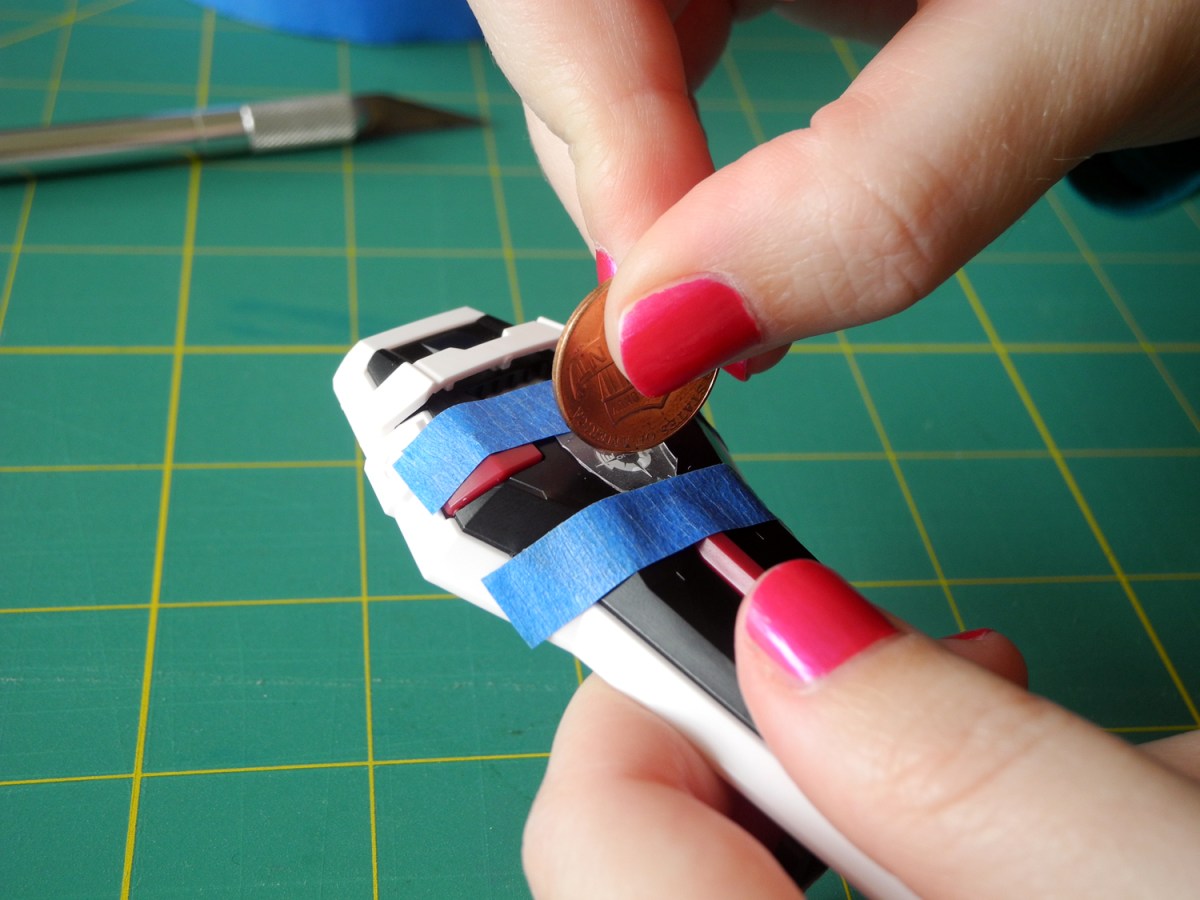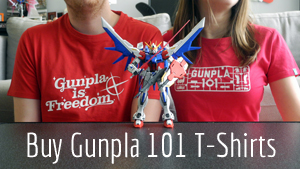A few months ago, I built my first Master Grade model, Strike Rouge. This was my first time seeing dry transfer decals as part of a kit, since these are usually designated to Master Grade and above only. Dry transfer decals, also called rub-ons or rubdowns, are a bit different from your ordinary Gunpla sticker. As the name suggests, you don’t use water, adhesive, or any other solvent to apply them.
Applying decals takes a few more steps than applying stickers, but it’s easy to do. Here’s how, from start to finish.
Assemble your materials. Aside from the Gunpla parts and decals, you’ll need a craft knife, a smooth-edged coin (like a penny or a euro), painter’s or masking tape, and scissors. You can see two different kinds of craft knives displayed here. I used the hobby knife that came in my Tamiya tool set, but you could also use a regular X-Acto knife. You’ll need the scissors to cut the wide painter’s tape into strips (more on that later) but you can also use very thin masking tape designed for artists. And of course, any time I am using a blade, I like to put my hobby mat down underneath.
Here you can see the guide to where decals go on the Gunpla, or specifically in this case, the Strike Rouge shield. Notice that the kit suggests I use either 2 or 11 for the center of the shield, so I have options.
I decided to go with 2, which you can see more clearly here. Notice the dry transfer decals are on a clear piece of plastic with a tissue paper sheet behind it. The paper sheet prevents the decals from transferring onto just any surface. Always keep the paper sheet behind your decals until you are ready to transfer them.
Time to cut out the decal. Press the knife firmly into the plastic, being sure not to cut too closely and leave some space around the decal. It’s OK if you cut into the paper behind it—once the decal in front of it is gone, you won’t need that exact piece of it anymore.
Notice also that I don’t have to worry about not touching the clear plastic sheet. The decals are on the other side, so any fingerprints I get on the sheet now won’t transfer over.
Here’s the decal cut out. You can see I left some space above and below it, which will be helpful for the taping step.
Line up your decal where you want it on the part, making sure it is straight. Then, take two strips of tape to keep it secure. I used painter’s tape here because it was easy to remove without affecting the plastic at all.
Now it’s time to apply the decal. Rub it firmly with the coin. You will be able to see the color of the decal changing slightly as it transfers from the plastic sheet to the Gunpla piece. If you look closely, you can even see that happening in the photo above—the decal appears gray, not white, in the places I have already transferred to my Gunpla.
Remove one piece of tape, and gently peel back the plastic sheet with the tip of your craft knife to ensure the decal has fully transferred. If it has not, put the tape back on and rub it some more. You really need a firm hand with this.
All done! Here’s what it looks like after I’ve peeled off the tape and removed the now blank plastic sheet. Repeat as many times as necessary and remember, you don’t need to apply every decal. Pick the ones you like best. Just make sure you don’t apply tape over decals you’ve already added—that might mess them up.
Here’s my Strike Rouge with a freshly decal-ed shield. That tiny text gives it a degree of detail nothing but decals can add. You’re ready to apply your own Gunpla dry transfer decals now, so happy building!



















22 Comments.
A concise, easy-to-read tutorial with really clear photography – nice job! It’s never occurred to me to use painter’s tape over scotch tape but it makes sense that it would leave behind less residue, so thanks for that tip!
One (hopefully) constructive comment – it might be helpful for those who are painting their gunpla for the first time to know where decal application falls in the order of painting operations. This order has worked for me: paint main colors -> apply clear coat -> apply decals -> apply clear coat again -> apply weathering effects -> apply clear coat to finish. Make sure to give ample time for paint to dry between each stage.
@disqus_RxkzGdDKVJ:disqus thanks for the tips! I will remember that “order of operations” for the first time I paint.
Hi! Does RG wing gundam zero ew’s sticker a dry transfer sticker or just a regular sticker? Thanks in advance
@disqus_5pQpe3w3FZ:disqus it’s a RG so I don’t know off the top of my head. Do they look like the ones in the photo?
It does not look like that, and I’m afraid to dip it in the
water because I don’t know if they are water slide stickers either, I’m afraid
it might lose its adhesive! =) I just
finish assembling the robot and the wings, I just have to put the stickers but I
wasn’t sure so I search the inet on how to put some stickers or decals and what
kind of stickers they are and I just found this site, hopefully it will help
me.. =)
@disqus_5pQpe3w3FZ:disqus is there a piece of tissue paper behind the clear part that the stickers are on? If so, you can bet it’s a dry transfer decal.
it does not have a tissue paper behind it, so i guess its just an ordinary sticker.. =) I will attach the picture of the sticker… maybe later when im home, im at office right now! hehehe!
One thing i would like to add, is if you use clear tape when you do these decals, if you put it over the decal and rub, you can see when itll start sticking onto the surface of the kit, which makes it easier to determine when your done rubbing. Eheh heh if i knew that you were doing this now i would of had much more input. I do also suggest that after you put on any kind of decal, that you use 1-2 layers of topcoat to help seal those decals onto the parts for much longer so they do not peel off over time.
Oh yes, You should look into Mr mark setter and Mr mark Softer for decals, as it helps stick them better to the plastics, as well as using the softer over conformed spaces, like curves and such. Thats all i have for the moment.
Nice tutorial. Strangely enough I found the best thing to use when rubbing on a dry decal is my nails. I tried with a few other tools (including coins) but for some reason that didn’t work well enough for me. I’ve only used dry decals once i’ve as i’ve only build on Master Grade. I find them to be more work than stickers but the results look nicer.
Did you have any trouble with dry decals that had really small details? I had two in particular with my Gundam RX-79 [G] MG where the decal was words in small font that didn’t seem to rub on as nicely as the larger decals. It was kind of frustrating and no matter what I did they wouldn’t rub off successfully.
Does RG wing gundam zero ew’s sticker a dry transfer sticker or just a regular sticker?
[…] Dry Transfer Decals 101 […]
I can’t get the decal to release with the rubbing and adhere to the transfer plastic. What am I doing wrong? I have already scraped two small holes on the paper!
@disqus_jD2naqlDqR:disqus maybe you can email me a picture of the decals you’re working with? I want to make sure they’re not stickers, waterslides, etc. Use our contact page.
Why are decals (dry and water transfer) so sparse in 1/144 scale?
@creepykin:disqus if I had to hypothesize, I’d say it’s because they’re more difficult to apply and cost more to make. Waterslides are almost nonexistent in modern kits of any scale, now.
Great tutorial! Just finished my MG Exia tonight, needed help getting started with decals this weekend.
Hi – is it possible to make custom dry decal’s ? if so how ?
Actually, yes! If you have an ink jet printer you can make them at home. I found a nice tutorial on a mommy blog here: https://bluebuttonpress.wordpress.com/2012/03/02/the-best-craft-secret-you-never-knew/
You can also make waterslide decals now too. Once you have the right paper you can do so with just about any program. Its how I was able to make my decals for my PG MK II a few weeks ago.
Thanks Lauren – I tried this at home yesterday but this does not work on Ceramic or glass (it smudges) and works reasonably well on paper / card. I am looking for having it done on my plastic toys that I have made at home
Great tutorial, is there a way to enhance the decal’s adhesion? On water slides there is an option to apply Mark Setter/Softer. Is there something for dry transfers?
I do them before I apply my matte topcoat. I find that topcoat helps stickers of any kind adhere better and for longer.